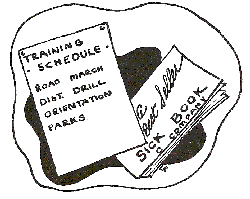|
Our first battle break came after the collapse of the German resistance west of the Rhine. We moved out of Ossenberg on 12th of March (still 1945 although the last week had seemed like a life time) and returned to Rheinberg and the vehicles. The drivers had 'many dangerous and harrowing experiences' to tell and all of us listened attentively.
We left the Rheinberg area about noon and headed west. Right outside of the city, three misplaced German planes strafed the anti-tank and company trains. Nothing was lost, nothing gained; three enemy planes were shot down. We arrived in Holland at 1800 Army time, 6:00 0, clock Dutch time, 12:00 A. M. New York time and 10:00 A. M. Louisiana time.
Everything was running very efficiently. Little things like rations and billets weren't available but outside of that, everything a tired, dirty combat soldier needs and desires was right at his disposal ... We ate, and then moved to the residential district and a fresh air school .... no windows! The next day, March 13th, we moved into private homes of Dutch families willing to take the risk, and used the school only as a motor pool, mess hall and guard house.
We did have a wonderful rest in Venlo all things considered. March 13th was spent moving into our billets along Jezuielenstraat (pronounced just like it's spelled) and cleaning out our halftracks, MI-AI converted

|
by ordinance to MI-A2. Supply issued candles to throw a little light on the situation but most of the night of the 13th of March was not seen by us ... Sleep was inevitable. Good Night.
The next day, the 14th of March, a training schedule was posted and the "sick-book" which was shunned during com pat again became the 'Best Seller' in the company. After that, many pills were seen around the area. It might be mentioned that a pass convoy with practically the whole company in it; three to be exact, pushed off For Valkenburg, Holland. Passes were issued feverishly during our stay in Venlo and all but 225 men got to go somewhere or other. The training schedule wasn't 'mill in the run' stuff, this very first morning told us that. Right after chow we mounted up in the halftracks and took off for Grifrath, Germany, a little town
not so far across the border. A division sand table had been set up here by the 53rd Engineers showing us the area we would probably operate in after crossing the Rhine. Lt. Kimpel gave us the 'poop'. When the discussion was over we all had a pretty good idea what was going to happen, but just when it was going to happen we could only guess. That same might we had a practice crossing of a ,pontoon bridge under the strictest blackout conditions and the next day we practiced a crossing from still another angle -in assault boats. These dry runs really meant a crossing was coming soon.
The First Army already had one bridgehead on the east ,bank and everyone knew the Ninth would be moving across in a short time. Although a lot of the boys thought the practice crossings were done a little
too dramatically, they didn't mind brushing up on the maneuvering and landing of the boats; but being made to
rush out in water up to our knees wasn't exactly appreciated. Bitching was in order and the ears of several engineers burned.
|